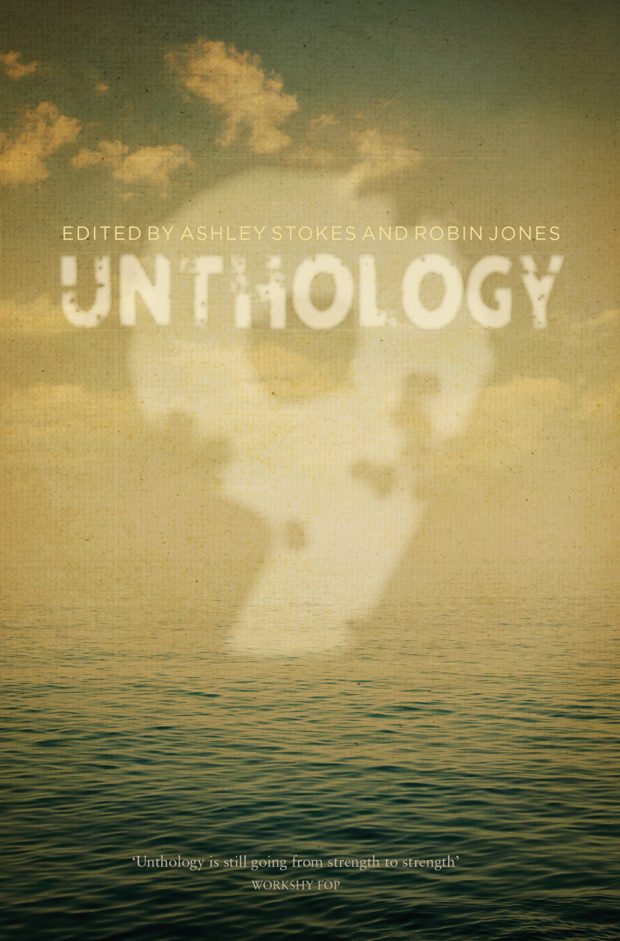You have no items in your cart. Want to get some nice things?
Go shopping“Welcome to the Archipelago,” say the editors, Ashley Stokes and Robin Jones, in their introduction to Unthology 9. It’s an apposite image. The stories contained in this volume were drawn from open submissions and, perhaps partly because of this, there is little thematic consistency or sense of underlying purpose to the selection. This is not to say, however, that the stories are especially diverse; rather, like small heads of rock poking out of the ocean, many of them share a certain insular perspective. There is a common focus on the self: on narrators or central characters caught in moments of interior crisis, on self-reflection, self-doubt, self-destruction, self-absorption. Of the seventeen stories collected here, by my reckoning four end in suicide or attempted suicide, three in unexpected acts of violence (perpetrated either by or against the central character), one in murder, and six in disappearances or dramatic exits of one sort or another. The stories are filled with break-ups and breakdowns, bereavements, betrayals, failures of nerve. Few relationships make it to the end, and few endings offer any hope. The characters rise and sink alone.
The collection begins strongly, with “I” by Rosie Gailor. A first-person stream-of-consciousness narrative, it announces at the opening: “Apparently drowning is the most euphoric way to die.” The story is told through the thoughts and memories of a woman who has decided to put this to the test, and the reader is introduced in the last moments of her life to a person who appears aggressive, uncaring, jealous, vengeful – and deeply lonely. Our sympathies are evoked and strained; we are pulled in so closely to the narrator it is as though she is holding us beneath the water. The piece is masterfully controlled, its rhythmic structure allowing the narrator’s thoughts to roam and return without the story itself ever losing direction.
“Traffic” by Nick Sweeney is another tight, surprisingly moving piece of writing. Set in the Ukraine, it follows Svitlana, a young woman exhausted by motherhood, boredom, and a country “imploding in the face of threats by outsiders, and by its own nationalists, gaping with shortages, hospitals no good, services gone to ruin, political life reduced to slogans shouted by stupid men with guns.” Seeing no other way to pursue the life she feels she has been cheated of, Svitlana conceives a plan to begin again in Romania, a plan she will fund by selling her baby. The scheme is not brutal, Svitlana assures herself: her son will be adopted by a rich western couple, and so, “It was elegant because everybody ended up happy.” The story is a true page-turner, its suspense generated as much by moral discomfort as by action.
A number of the stories gathered here begin promisingly and are well-written, but drift at the end. It is possible that, rather than being symptomatic of a general malaise, some of the downbeat endings points to authors unsure where their stories can go. For me, one of the highlights of the collection is “In Rehearsal” by Sarah Evans, a piece which bucks the trend and ends on a note of tentative optimism. Calmly told, with no gimmicks, the story is of a doctor who elects to carry out experimental surgery on a severely ill newborn child. The doctor’s disposition is analytical, even cold. “I always refer to the baby,” she tells the reader, “I haven’t asked if she already has a name, and I don’t intend to.” Convincing the baby’s parents to agree to the operation, “I tread the familiar line between openness and dissimulation, choosing my words, judging how much information to volunteer.” Along with the surgeon, we balance the wonder of success against the risk of failure, we consider the motivations which allow humans to take chances with their own and other lives, and we weigh up the bravery and selfishness of those tasked with making life-and-death decisions. This is a subtle and deeply felt examination of the human condition and illustrates the power the short story can have.
Unthology 9 is handsomely produced and does a very good job of giving exposure to writers who are, for the most part, not yet well-known. The best of the work here is excellent. If the sense of isolation becomes a little overwhelming at times, it is compensated for by those stories which look out more widely, and which carry a moral charge forceful enough to challenge the reader’s view of the world.
Unthology 9 is published by Unthank Books.

About Anna Lewis
Anna Lewis is the author of three poetry collections. Her latest pamphlet, A White Year, is published by Maquette. Recent short stories have appeared in New Welsh Review, The Interpreter's House, and on Litro.





